By Masaya Tsunamoto and Tsujitomo | Published digitally by Kodansha Comics
 Although I genuinely, deeply love shounen sports manga, I can’t deny that most follow similar story beats. I knew going in that Giant Killing is actually seinen, but wasn’t prepared for what a breath of fresh air it would be.
Although I genuinely, deeply love shounen sports manga, I can’t deny that most follow similar story beats. I knew going in that Giant Killing is actually seinen, but wasn’t prepared for what a breath of fresh air it would be.
Instead of some first-year joining his high-school team, the protagonist of Giant Killing is Takeshi Tatsumi, a 35-year-old former pro soccer player turned coach. The series opens with Yuri Nagata and Kosei Gotou, the PR rep and general manager of East Tokyo United (a struggling Japanese team) finally locating Tatsumi at his job in England, where has led a team of amateurs to a top-32 finish in the Football Association Cup. They have even managed to crush professional teams.
It turns out that Tatsumi specializes in leading underdog teams to victory against highly favored opponents. He sees it as a David-and-Goliath scenario, hence the title of the series. Initially, the English club president doesn’t want to let Tatsumi out of his contract, but when he learns that Tatsumi used to play for ETU and that there are desperate fans in his hometown waiting to be helped, he relents and lets him go.
Tatsumi doesn’t seem to particularly care either way and it’s this neutrality that makes him an interesting character and effective coach. For instance, at his first practice session with the ETU team, he makes them run sprints for 45 minutes. Those with the most stamina turn out to be the younger guys, but they’re also merely the alternates on the team. With his guidance, they manage to defeat the older starters in a scrimmage. The stalwart veteran of the team, Murakoshi, gets his pride wounded by this, but rather than suggest that he’s no longer useful, Tatsumi instead points out that what he needs is to find his own secret weapon to overcome these odds. Tatsumi is adept at seeing a team or an individual’s shortcomings and offering strategies to overcome them, and that’s the kind of reliable leadership that Murakoshi has done without all these years.
On the one hand, Tatsumi exemplifies the gifted protagonist that this genre is full of, but his gift is not in his own athletic prowess (or not merely that) but rather his ability to furnish others with the tools they need to succeed, to reinvigorate failing franchises, and to rekindle fan enthusiasm. And, of course, the clubs don’t mind the boost in revenue that inevitably results. Giant Killing is every bit as addictive as a shounen series, but with grown-up stakes and nuance. I can’t wait to read more!
Giant Killing is ongoing in Japan, where the 43 volumes have been released so far.
Review copy provided by the publisher.

 Eijun Sawamura really wanted to make some good baseball memories with his middle-school friends, but even though they practiced hard, they couldn’t win a single game. Although he shows talent as a pitcher, his unsportsmanlike behavior after a bitter defeat means most of the good baseball schools are no longer interested in him. And, because he is a hot-headed yet enthusiastic idiot, he totally forgot about the entrance exams required for other schools.
Eijun Sawamura really wanted to make some good baseball memories with his middle-school friends, but even though they practiced hard, they couldn’t win a single game. Although he shows talent as a pitcher, his unsportsmanlike behavior after a bitter defeat means most of the good baseball schools are no longer interested in him. And, because he is a hot-headed yet enthusiastic idiot, he totally forgot about the entrance exams required for other schools. and the second volume ends with the cliffhanger… will he and another first year succeed in scoring against overwhelming opponents?
and the second volume ends with the cliffhanger… will he and another first year succeed in scoring against overwhelming opponents?


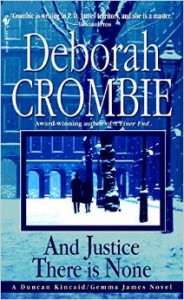
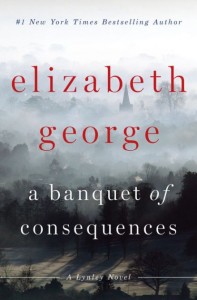 A Banquet of Consequences by Elizabeth George
A Banquet of Consequences by Elizabeth George The End of Everything by Megan Abbott
The End of Everything by Megan Abbott The Ex by Alafair Burke
The Ex by Alafair Burke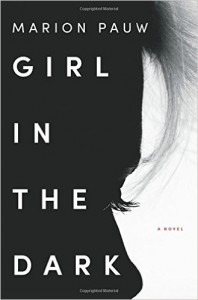 Girl in the Dark by Marion Pauw
Girl in the Dark by Marion Pauw Mr. Kiss and Tell by Rob Thomas and Jennifer Graham
Mr. Kiss and Tell by Rob Thomas and Jennifer Graham The Mysterious Affair at Styles by Agatha Christie
The Mysterious Affair at Styles by Agatha Christie The Outpost by Mike Resnick
The Outpost by Mike Resnick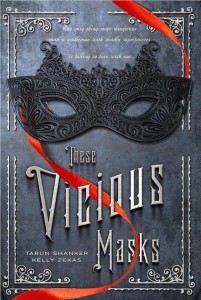 These Vicious Masks by Tarun Shanker and Kelly Zekas
These Vicious Masks by Tarun Shanker and Kelly Zekas I spent all my time wondering “what if,” then one day I woke up and I was 33.
I spent all my time wondering “what if,” then one day I woke up and I was 33. Chihayafuru is a long-running josei sports manga series about a girl who discovers a passion for the Japanese card game,
Chihayafuru is a long-running josei sports manga series about a girl who discovers a passion for the Japanese card game, 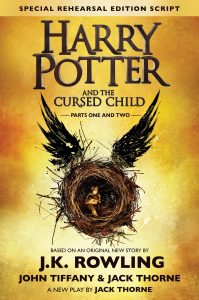 Harry Potter and the Cursed Child joins
Harry Potter and the Cursed Child joins  In the opening scene of Wave, Listen to Me! we meet Minare Koda, an attractive twenty-something drinking too much and pouring her heart out to a guy she just met forty minutes prior. She’s ranting about her ex, Mitsuo, and after a certain point, she has no recollection of events. To her surprise, when she’s at work the next day (as a waitress in a curry shop), she hears her own voice being played over the radio. Turns out, the guy she met was Kanetsugu Mato, who works for a radio station and recorded their conversation. (One of the things she’d forgotten was drunkenly giving her consent.) Minare is temperamental and feisty, so when she marches down to the station to give him a piece of her mind, she ends up going live on the air and impressing Mato with her facility for impromptu eloquence.
In the opening scene of Wave, Listen to Me! we meet Minare Koda, an attractive twenty-something drinking too much and pouring her heart out to a guy she just met forty minutes prior. She’s ranting about her ex, Mitsuo, and after a certain point, she has no recollection of events. To her surprise, when she’s at work the next day (as a waitress in a curry shop), she hears her own voice being played over the radio. Turns out, the guy she met was Kanetsugu Mato, who works for a radio station and recorded their conversation. (One of the things she’d forgotten was drunkenly giving her consent.) Minare is temperamental and feisty, so when she marches down to the station to give him a piece of her mind, she ends up going live on the air and impressing Mato with her facility for impromptu eloquence. Volume two is where things really get great. Mato has inventive ideas for Minare’s show, and I think I will let readers discover those for themselves. What I really loved, though, was the continued exploration of Minare’s personality. For example, when she has the jitters and receives reassurance, she cries, “I can feel it rushing back! My usual baseless, overflowing confidence!” She might have come off as an unsympathetic and abrasive character, but that line shows that she’s fully aware of her flaws. Later, after a brief (and awesome) reunion with Mitsuo, she displays a knack for more self-analysis, reflecting that while she usually doesn’t take shit from anyone, she has a certain weakness for pathetic guys who need someone to dote over them. I expect that this capacity for reflection will allow her to make the most of the opportunity she’s been given.
Volume two is where things really get great. Mato has inventive ideas for Minare’s show, and I think I will let readers discover those for themselves. What I really loved, though, was the continued exploration of Minare’s personality. For example, when she has the jitters and receives reassurance, she cries, “I can feel it rushing back! My usual baseless, overflowing confidence!” She might have come off as an unsympathetic and abrasive character, but that line shows that she’s fully aware of her flaws. Later, after a brief (and awesome) reunion with Mitsuo, she displays a knack for more self-analysis, reflecting that while she usually doesn’t take shit from anyone, she has a certain weakness for pathetic guys who need someone to dote over them. I expect that this capacity for reflection will allow her to make the most of the opportunity she’s been given. Widowed math teacher Kohei Inuzuka wants to do his best when it comes to raising his daughter, Tsumugi. It’s been six months since his wife passed away, and because he has never had much of an appetite and hasn’t fared well with cooking in the past, he mostly relies on store-bought fare for Tsumugi. However, after they run into one of his students, Kotori Iida, while looking at cherry blossoms, he can’t help but notice how fascinated Tsumugi is by the home-cooked lunch Kotori’s been eating. To make his daughter happy, he ends up taking her to Kotori’s family restaurant, which leads to regular dinner parties where they experiment with making different things together.
Widowed math teacher Kohei Inuzuka wants to do his best when it comes to raising his daughter, Tsumugi. It’s been six months since his wife passed away, and because he has never had much of an appetite and hasn’t fared well with cooking in the past, he mostly relies on store-bought fare for Tsumugi. However, after they run into one of his students, Kotori Iida, while looking at cherry blossoms, he can’t help but notice how fascinated Tsumugi is by the home-cooked lunch Kotori’s been eating. To make his daughter happy, he ends up taking her to Kotori’s family restaurant, which leads to regular dinner parties where they experiment with making different things together. chawanmushi, and some seriously drool-inducing gyoza. Recipes are included, and for the first time, I feel like they’re actually something I might attempt.
chawanmushi, and some seriously drool-inducing gyoza. Recipes are included, and for the first time, I feel like they’re actually something I might attempt.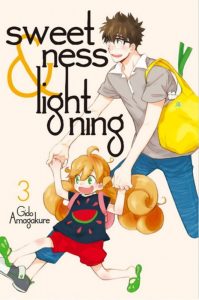 He and Kotori maintain their distance at school, and he frequently worries about inconveniencing her mother. And yet, the gatherings make Tsumugi so happy—and even lift her spirits when she begins to truly comprehend the permanence of her mother’s absence—that he gratefully accepts the Iidas’ hospitality. He behaves professionally at all times. Kotori, however, seems to be developing feelings for him, though it’s all mixed up as she sees him as both a guy and as a father figure. I wouldn’t be surprised if the manga ends with them getting married, but I hope nothing romantic ensues for a very long time.
He and Kotori maintain their distance at school, and he frequently worries about inconveniencing her mother. And yet, the gatherings make Tsumugi so happy—and even lift her spirits when she begins to truly comprehend the permanence of her mother’s absence—that he gratefully accepts the Iidas’ hospitality. He behaves professionally at all times. Kotori, however, seems to be developing feelings for him, though it’s all mixed up as she sees him as both a guy and as a father figure. I wouldn’t be surprised if the manga ends with them getting married, but I hope nothing romantic ensues for a very long time.

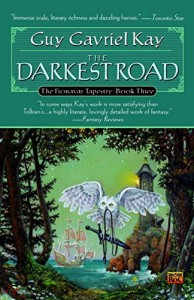



Recent Comments